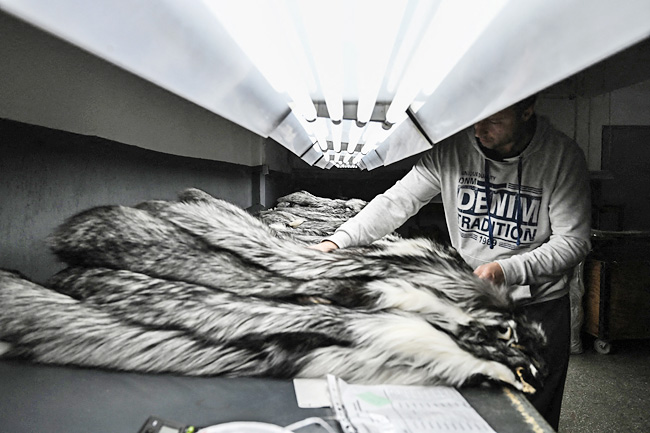AFP – In a large exhibition hall in northern Greece, Russian women would once strike a pose in a gold throne-like armchair, wrapped in their brand-new furs.
“They felt like tsarinas. Now, nobody sets foot in here,” said a hall employee who declined to give his name.
While the fur industry has declined in recent decades after fierce campaigning from animal-rights activists who decry its cruelty, the material has remained sought after in countries like Russia and China.
In Greece, a major centre of fur exports to Russia, European Union sanctions on Moscow have dealt the industry yet another blow.
Fur is among the luxury goods whose export to Russia has been banned. Dozens of businesses in northern Kastoria and Siatista – which have produced furs since the 15th Century – have had to close down in the wake of the war in Ukraine.
“We are suspending our operations. I sidelined 80 per cent of my staff, a total of 52 people,” said head of the Hellenic fur federation Akis Tsoukas

An Ernst and Young study in 2019 found that fur was among Greece’s top 12 exports, with some coats selling for as much as EUR200,000 (USD213,000).
Tsoukas said before the Covid-19 pandemic in 2019 – fur exports earned EUR108 million, almost half of it from Russia.
Another EUR21.5 million in fur was sold in the United Arab Emirates, where it was also mostly snapped up by Russians. Ukraine took another EUR10 million worth of product.
A year later, exports essentially fell to zero, Tsoukas said.
The pandemic hit the industry hard, with millions of mink culled on fur farms after some animals tested positive for the virus.
WE ARE IN DESPAIR
Unable to export their goods, local artisans are moving to Russia to try and find work.
“My father was a furrier and I learned the craft from a very young age,” said Apostolis Gravas, a 47-year-old who runs his family’s fur business in Siatista.
“Coronavirus and the war have wiped us out. We are in despair. That’s why I looked for work in Russia. Many people like me go to Russia to find a job,” he told AFP.
Maria Fotis, who has worked in the sector since 1979, said Russia was looking for experienced workers to join their own industry.
“I haven’t seen them being bothered that much by the war. As they can no longer buy from Greece, they started producing and selling fur there,” she said.
At the workshop in Chelyabinsk, southern Russia, where she found employment, Fotis said six out of eight employees were Greek.
“But you can stay there only three months, until the visa expires,” she noted.
NEAR-TOTAL SHUTDOWN
Voio mayor Christos Zefklis said 80 per cent of residents in nearby Siatista and surrounding villages survived off the fur industry.
“How are they going to retrain now? This whole transition to a new economic model is proving very costly to their living standards,” he said.
According to official figures, half of the 4,000 fur artisans in Siatista and Kastoria have been forced to leave the profession this year.
Mink farms in the area have also been affected and have halved production as a result, said a spokesman for the Panhellenic association of fur-bearing animal breeders Miltos Karakoulakis.
Forty of 92 farms have shut down, and those remaining are expected to raise one million mink, down from 1.8 million in past years, he said.
The furriers are now seeking to tap new markets in Europe, the United States, China, Japan and Korea.
“We will try for a few more years to focus on different markets. There may be a way to break the embargo but it’s not like we are smuggling weapons or things like that,” said 50-year-old Nikos Gliayas, whose family has been in the business since 1960.


